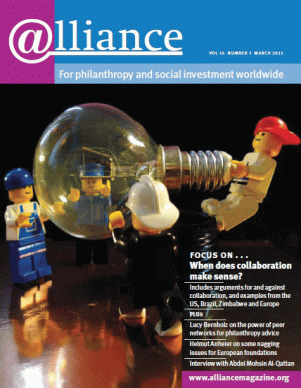Is it really necessary for foundations to hire external experts to outline the conditions for collaboration? The EFC Network Building Committee decided that it is, which is why it commissioned FSG Social Impact Advisors to produce a report on the subject – Multiplying Impact through Philanthropic Collaboration.
Foundations have neither a tradition of, nor aptitude for, collaboration with their peers. Rather, we are used to collaborating with those who we fund. If we aren’t used to collaborating with domestic colleagues, we are even less used to doing so with colleagues from other countries. Often, we aren’t even sure whether we would like more collaboration or not. ‘Other foundations are so different from us. They have their programmes, we have ours’ is often the attitude. Everybody wants development but nobody likes the thought of change!
Why, then, does a foundation like mine seek collaboration? Stiftelsen Riksbankens Jubileumsfond is one of the major Swedish funders of research in the humanities and social sciences. Originally, nothing in our strategy seemed conducive to collaboration but, following the current vogue, we saw the possibility of achieving higher impact. In some cases I think it is fair to say that we acted opportunistically. For example, we are much smaller than the state research councils, but by collaborating with other foundations we saw that our achievements could be greater and more visible and our impact greater. In some cases, we could not invest enough even to start a programme on our own. I could also give examples of how the decision-making process in the board of directors has been made easier by the opportunity of collaboration. In some cases, it is simply easier to talk about the relevance of our contribution when several funders are ready to take part.
Through collaboration we learn from each other. Having to meet mutual difficulties can be stimulating, and fuzzy visions can be transformed by colleagues from different organizations. During the past few years, Riksbankens Jubileumsfond has had a big, successful project with VolkswagenStiftung and Compagnia di San Paolo. The European Foreign and Security Policy Studies programme has financed about 100 young researchers and experts for two years. The goal was to build truly European – rather than national – expertise on foreign and security policy. In this case, the foundations did not establish a special organization to carry out the practical work. Instead staff members created a network of their own, following some general guiding principles, and reported regularly to the management. I am convinced that one crucial success factor was the informality of the collaboration. We managed to avoid the heavy and costly bureaucracy that so often kills creativity and engagement.
I therefore appreciate FSG’s report, which takes up both the possibilities and the limitations of collaboration in a very matter-of-fact way. Collaboration is built on openness and on the ability to identify common needs and potential. Without engagement, financial resources and time to create the vision of collaboration there is no chance of succeeding. Support from the management is essential but so is the engagement of staff. The schedule must be realistic and predictable. On the other hand, some limits are necessary: the final goal shouldn’t be waiting in a distant future.
Interest, opportunity and time seem to be the key words in FSG’s report. It provides much concrete and sensible advice for foundations, and I think the recommendations could be useful and inspiring for training and seminars for the boards and employees of foundations. I think they could also provide inspiration for the EFC about how the organization can develop as an incubator of collaboration.
If the EFC takes on the role of incubator and facilitator, it is essential to avoid all unnecessary fuss. This is a great challenge for a democratic organization like the EFC. Who will decide on collaborations? How will the EFC give priority to collaboration among all its other tasks?
However, it should not become automatic that a project needs to pass through the EFC. Sometimes it is better for foundations to collaborate without intermediaries. The EFC is as an extraordinary meeting place: it is there that the interest is awakened, and there that we learn to like and trust each other!
Göran Blomqvist is managing director of Riksbankens Jubileumsfond and a member of the EFC Network Building Committee. Email goran.blomqvist@rj.se


Comments (0)